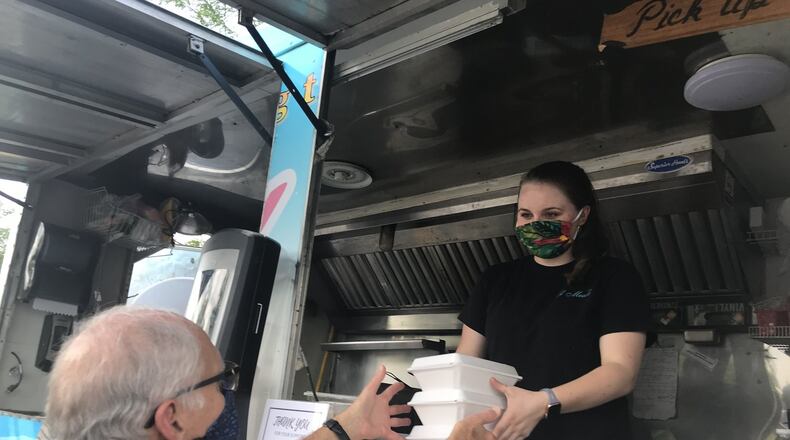There are about 220,000 Ohioans living with the disease and Alzheimer’s disease is the sixth leading cause of death in the United States.
MORE COVERAGE
Caregiver shortage a problem in Dayton area
Alzheimer’s caregivers seek connection as outbreak isolates
The association has seeking to get the same level of support - even with social distancing - by encouraging people to find other ways to fund raise and encourage giving online.
On Friday ahead of “The Longest Day,” RetireMEDiQ in Miamisburg, which is a longtime supporter of the association, worked with El Meson to bring the food truck to the Medicare broker’s parking lot for a carryout fundraiser.
Don Mackos, president of RetireMEDiQ, said they typically hold events and fundraisers that over the year raise about $75,000 to $80,000 toward the association.
“It’s important to still look for ways to support them,” Mackos aid.
One of the major things funded with the money is Alzheimer’s research. In fiscal year 2019, the association nationally funded $42 million in new research projects and it is currently funding $167 million projects.
About 25% of the research projects the association funds are investigating brain imaging, fluid biomarkers including blood tests, and clinical tools aimed at earlier diagnosis, timelier interventions, and effective disease monitoring.
“You can go to the doctor and get tested to find out if your levels are close to diabetic … we’re actually moving in the direction of trying to find biomarkers for Alzheimer’s’s that are usable, like in a doctor’s office where people can access that,” said Eric VanVlymen, executive director of the Alzheimer’s Association Miami Valley Chapter.
MORE: How to volunteer as a nursing home resident advocate
Biomarkers and earlier detection matter for treatment when they can be paired with meaningful ways to research and respond to what’s detected.
About 30% of the funded projects are exploring processesas well as cellular properties and functions that may normally protect and maintain nerve cells in the brain. Van Vlymen said 10 years ago, people would enter trials typically after they were experiencing severe dysfunction and now they can start trials with patients much earlier and more meaningfully seek ways to prevent disease.
“Through research, we’re identifying people much earlier and starting starting treatment trials before the dementia symptoms show,” he said.
About 27% of the projects are studying potential factors that may increase or decrease an individual’s risk for dementia and ways to improve care for people at all stages of Alzheimer’s and related dementias and interventions to support new technology as well as those providing care. In addition, projects may focus on better understanding and addressing health disparities.
And about 18% of the projects are exploring novel treatment strategies for potential drug and non-drug interventions.
VanVlymen said over the last seven years through a mix of association donated dollars and advocacy for more funding that research funding for Alzheimer’s in the U.S. has increased from around $400 million to around $2.4 billion.
How to get Alzheimer’s help and information
For questions about Alzheimer’s or to get connected to support, the Alzheimer’s Association has a 24/7 hotline at 1-800-272-3900 for free, around-the-clock help and the latest information. You can also go to alz.org to find more information and support groups.
About the Author
